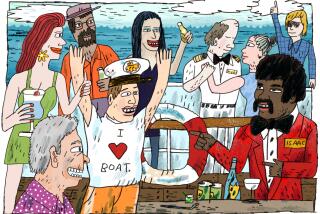The Right Rule of Thumb for Alcoholic Drinks : Liquor: Legal drinking age may vary from 17 to 21, depending on the state, country or port. Airline, hotel and cruise ship personnel rely mostly on judgment.
- Share via
Whether or not to serve alcoholic beverages to underage travelers generally involves a judgment call on the part of the staffs and crews of hotels, airlines and cruise ships.
In most cases, obtaining alcoholic beverages while traveling is easy. Cruise passengers and hotel guests can generally just sign their cabin or room number after being served. In addition, room service may be available, and hotels frequently have mini-bars that stock alcoholic beverages. Most airlines offer or sell alcoholic drinks on their flights.
In California, the state law covering intra-state flights, hotels and cruise ships in port prohibits serving liquor--including beer and wine--to anyone under the age of 21. In fact, since July of 1988, when Wyoming and South Dakota changed their laws, the legal drinking age has been 21 in all 50 states.
With airlines, determining the actual age of passengers is up to the carrier, said Fred O’Donnell, a spokesman for the Federal Aviation Administration.
“FAA regulations don’t cover the serving of alcoholic beverages,” O’Donnell said. “It’s up to the airlines to show good judgment.”
“No one under 21 can be served alcoholic beverages, which includes beer and wine,” said Agnes Huff, a spokeswoman for USAir. “If our in-flight staffs have any doubts about a passenger’s age, they’re trained to politely ask for proof of age.”
On international flights aboard foreign carriers, it’s up to the individual airline to decide what age passengers must be to get served alcoholic beverages. The reality is that on longer, more expensive international flights, airlines are likely to have a more liberal policy when it comes to serving free alcoholic beverages. Thus, a greater chance that underage passengers could get served.
Not necessarily, say foreign airline representatives.
“Alcoholic beverages are free in all classes of service, but someone has to be at least 18 to be served,” said Joe Zucker, a spokesman for Lufthansa. “Our crews are trained to use their judgment in making a determination of age, and passengers who appear to be younger will be asked to show their passport or other proof of age.”
Varig, the Brazilian airline, offers complimentary alcoholic beverages to passengers 21 and over in all classes of service on its international flights. “Though we offer gratis drinks, this doesn’t mean that the age at which minors can be served is overlooked,” said Bob Neumann, a Varig spokesman in Los Angeles. “Flight personnel must observe the same rules whether the drink is free or not. If they don’t, it can be cause for termination.”
SAS requires passengers to be at least 21 before they can be served alcoholic beverages, said Eileen Drutman, an airline spokeswoman. But Singapore Airlines allows anyone 17 or older to be served free alcoholic beverages, according to Singapore spokesman Bob Candiotti.
Hotel personnel also must make judgment calls on whether to serve alcoholic beverages to guests--in rooms and lounges as well as poolside and in other places where drinks may be ordered. Hotels often issue identification cards that permit guests to sign their room number for drinks, meals and other services. Mini-bars are increasingly available in hotel rooms, many that contain liquor when allowed by local laws. There are some mini-bars that have a separate key for the section containing alcoholic beverages, and another key to open the entire unit.
Hilton has a training program for its employees, “We Care--Serving Alcohol With Care,” that provides guidelines on the issue of serving alcoholic beverages. Alcohol servers must be aware of the legal drinking age of the state in which the hotel is located, and check the identification of any guest suspected to be under the legal drinking age.
“Front-office personnel are required to ask guests at check-in if they would like a mini-bar key. Parents are responsible for whether or not children have access to the key,” said Kendra Silverman, a Hilton spokeswoman.
Parents are also responsible for giving underage children any hotel-issued cards that enable guests to sign their room number for various services, including food and beverages. However, even if a minor has possession of such identification, it is still the responsibility of servers to make sure underage children aren’t served alcohol, according to Stephen Beehag, vice president of food and beverage operations for Ramada.
“Minors have to show their own proof of age, which could be a passport overseas,” Beehag said. “They can’t just show hotel identification and say they’re bringing drinks to parents.”
The issue of underage passengers being served alcoholic beverages on cruise ships can be tricky.
Since passengers frequently don’t carry wallets and purses aboard ship, and often charge services to their cabin number, cruise personnel may have to check with the purser’s office, which has a manifest that would show a passenger’s age.
“Our instructions to our serving staff is that they shouldn’t serve hard liquor to anyone under 21, and beer or wine to anyone under 18,” said Mimi Weiss, a spokeswoman for Royal Caribbean Cruise Line. “This is a judgment call by the staff. If there’s a dispute, passengers can always show proof of their age.”
Crystal Cruises also uses 21 and 18, respectively, as minimum ages for passengers to be served hard liquor and beer/wine. “Our staff is pretty strict; they’ll ask questions if they think someone is underage,” said Darlene Papalini, a Crystal spokeswoman.
Aboard the ships of Carnival Cruises, 18 is the cutoff for alcoholic beverages, including beer and wine. “We ask that our personnel use their judgment, and it’s better to be wrong than to find out later that someone was too young,” said Jennifer de la Cruz, a line spokeswoman.
Princess Cruises’ policy is that no one under 18 can be served alcohol, including beer and wine, said Julie Benson, a Princess spokeswoman. “On sailings with a large number of teen-agers, such as during holidays, we manually code the cruise or identification card to alert our staff that this person is underage. Otherwise, we rely on our staff to use good judgment.”
It is conceivable, admit cruise representatives, that waiters or stewards may believe that they are too busy to take the time to check a passenger’s age. “If we determine that a staff member serves drinks to minors, it can be reason for termination,” Benson said.
Another potential problem can arise when liquor purchased at ports of call is consumed in cabins on-board the ship.
“For the most part, we can control what takes place on ship, but we obviously can’t patrol inside cabins,” Benson said. “Parents also have a responsibility in this sort of situation.”
More to Read
Sign up for The Wild
We’ll help you find the best places to hike, bike and run, as well as the perfect silent spots for meditation and yoga.
You may occasionally receive promotional content from the Los Angeles Times.






